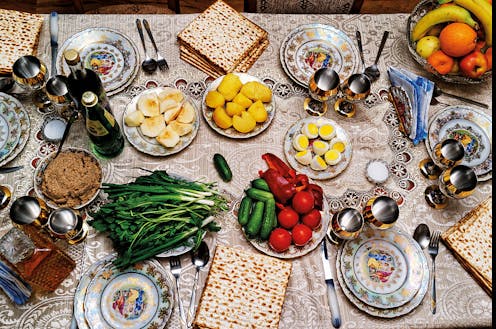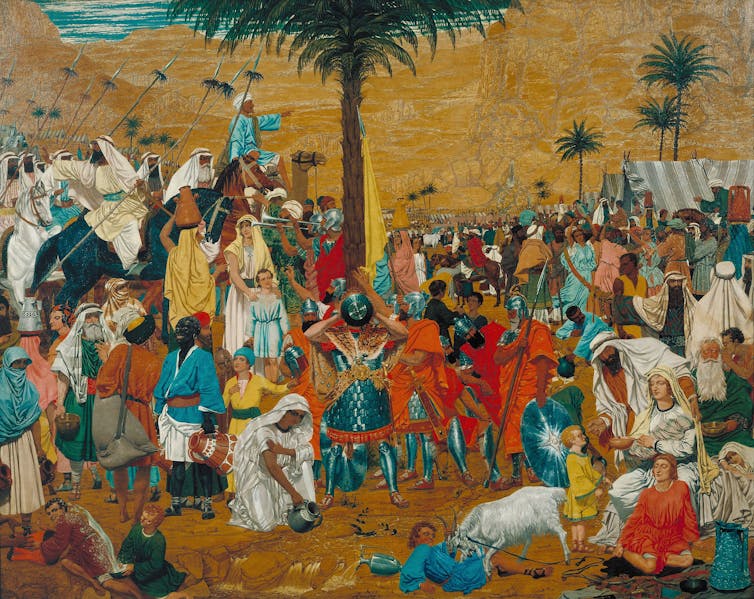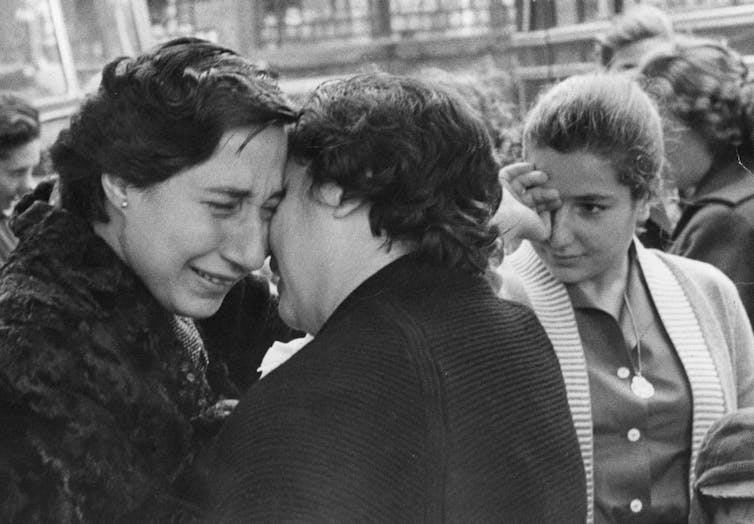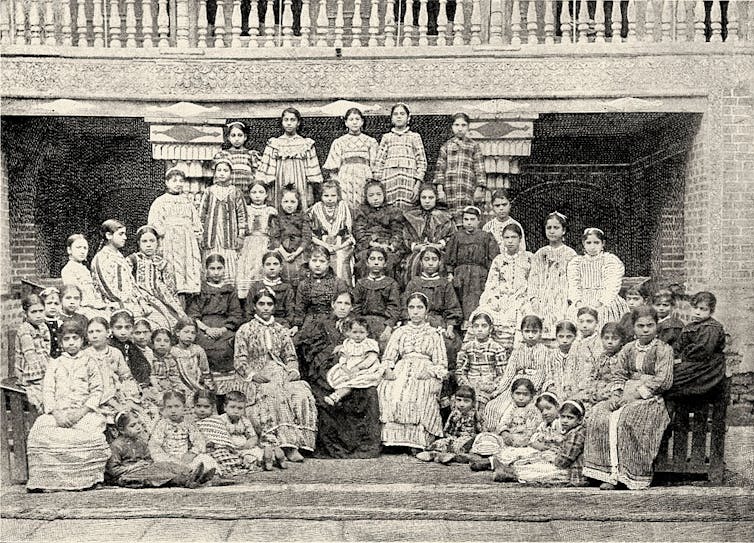Passover: The festival of freedom and the ambivalence of exile
The Passover Seder commemorates the escape from slavery in Egypt. But then came the 40-year wandering in the desert – a story that resonates with much of Jewish history.

The Jewish holiday cycle is, to a large extent, an exploration and commemoration of the experience of exile. The fall festival of Sukkot, for example, is celebrated in small booths, temporary shelters that recall the Israelites’ experience sheltering in tents while wandering in the desert for 40 years after fleeing slavery in Egypt. The story of Purim, a springtime festival, takes place when ancient Jews lived in exile in the Persian Empire – and illustrates the precariousness of life as a minority.
And then there’s Passover, which begins on April 22, 2024. It marks the Israelites’ Exodus from Egypt – the first step toward redemption. The theme of freedom dominates the holiday.
Passover is the only holiday that marks the transition from exile to wandering, and not to homecoming, highlighting the complexity of exile – the focus of my recently published book, “Exile and the Jews,” co-edited with Marc Saperstein.
As a literary scholar, I look to novels and memoirs for examples that illustrate exile and its aftermath from different perspectives. Here I focus on those from the Jewish communities of Egypt and Iraq, sites of the two major exiles in Jewish history.
Into the unknown
In her 1983 novella “The Miracle Hater,” the late Israeli novelist Shulamit Hareven depicts the Hebrews in their passage from Egypt and their first taste of freedom. Writing a modern “midrash” – a rabbinic genre that elaborates on a biblical text – she reimagines the story of Exodus.
Whereas the biblical description centers on heroic leaders like Moses and Joshua, Hareven concentrates on the unnamed masses: the Jewish slaves who have just crossed the Red Sea, now faced with life in the desert and becoming a new community.

Hareven’s narrative elaborates on the uprooting wrought by the Exodus, exploring the unexpected ambivalence with which the Hebrews face their newfound freedom. They have fled oppression, but that means leaving everything familiar to wander, seemingly endlessly, in the great unknown of the desert.
Israeli writer Orly Castel-Bloom weaves family lore, history and some alternative history into “An Egyptian Novel,” published in 2015. She both invents and lays claim to the one family who did not join the exodus in ancient times but remained in Egypt throughout the ages. Although they are merely a passing mention, their existence gives the reader pause to wonder if indeed any of the Hebrews stayed behind.
Many Jews did stay behind after the next major exile in Jewish history, which began when Babylonia besieged Jerusalem and deported residents of the conquered city in 586 B.C.E. When Persian king Cyrus the Great issued an edict almost 50 years later inviting the Jews to return to Jerusalem and the land of Judah, only a minority did so. Those who remained in Babylon became the root of the diaspora and established the oldest continuous Jewish community in the world.
‘Out of Egypt’
More recently, Jews have lived in both of these sites of ancient exiles: modern-day Egypt and Iraq. While those in Iraq could claim a history of hundreds of years, those in Egypt were more likely to have moved there within the last few generations.
In his 1995 memoir “Out of Egypt,” novelist, essayist and professor André Aciman – best known for the book-turned-film “Call Me By My Name” – writes movingly and memorably about living on the eve of exile.
By the early 1960s, Jews found themselves less welcome in Egypt. Aciman details the harassment his family endured – anonymous phone calls, surveillance, seizure of the family business by the government – before they were given orders to leave.
“It never occurred to us that a seder in Egypt was a contradiction in terms,” he wrote in The New York Times, describing the Passover meal his family held the night before their departure. The Egypt of the Exodus story seemed far from the Egypt of Aciman’s childhood, the one he loved.

Looking back at that last meal, the novelist wondered just what was being celebrated, and which departure of the Jews the Seder was commemorating. “The fault lines of exile and diaspora always run deep, and we are always from elsewhere, and from elsewhere before that,” he noted.
In “Out of Egypt,” the irony of the family preparing to leave on Passover is not lost on the author, the reader or, one suspects, the characters themselves. After a rather dismal attempt at a Seder, the narrator wandered through the streets of Alexandria, mourning a place that had become home. Until this moment, the idea of Egypt as a place of exile had not occurred to him; the idea of Israel being a place of return foreign.
On that last evening, the narrator walked the promenade along the waterfront and was offered “fiteer,” sold on street corners in honor of the Muslim holiday of Ramadan. It is not kosher for Passover, when leavened grains are forbidden, but the boy enjoyed the fried dough, the taste of which he recalled with pleasure many years later.
The blend of cultures, foreign and local, shows the family to be not unlike other cosmopolitan-mongrel Jews living in Egypt at the time. The city was “so inseparable from who I was at that very instant,” the narrator recalls. “And suddenly I knew … that I would always remember this night.”

It is a poignant account of the very personal nature of exile. And yet it is an experience potentially shared by everyone in the Jewish community. Exile is a place unknown, over the edge of the precipice.
Into Iraq
The Passover holiday is also at the center of British journalist Tim Judah’s visit to Iraq to cover the 2003 American invasion. He was the first of his family in many years to “return” to Baghdad. His father’s family had left Iraq in the 19th century for India in the wake of persecutions during Dawud Pasha’s reign.
Noting that his visit would coincide with the holiday, Judah set out to meet as many of the estimated three dozen Jews who still lived in Iraq. The journalist found faint traces of the once-thriving community: palimpsests of stars of David in brickwork, a Hebrew inscription in Ezekiel’s tomb. At the time of Iraq’s independence in 1932, Jews comprised a plurality in the capital; business came to a standstill on Saturdays, the Jewish Sabbath.

The rise of Arab nationalism, the establishment of the state of Israel and shifting geopolitics led to the mass emigration of the Jewish community in the early 1950s. By 2003, the few Jews Judah found lived in trepidation and ramshackle homes.
“I tried to picture my forebears, in the fields or perhaps in the shops or the market, but I couldn’t,” Judah wrote in Granta magazine. “A cold grey dust filled the air. Wrecked cars and burnt-out tanks littered the road back to Baghdad. … So my ancestors lived here for 2,500 years? So what? My pilgrimage was over. I will never need to do it again.”
Judah’s pilgrimage leads not to a renewed sense of belonging but a break. His family’s uprooting is complete.
And so it goes, the cycle of exile and remembrance, uprooting and rerooting. With the Passover holiday, those free can celebrate their freedom, and those who are rooted, their rootedness. Yet at the same time, families around the Seder table can remember those who are not yet free, and those still suffering from being uprooted.
Nancy E. Berg does not work for, consult, own shares in or receive funding from any company or organization that would benefit from this article, and has disclosed no relevant affiliations beyond their academic appointment.
Read These Next
When ICE sweeps a community, public health pays a price – and recovery will likely take years
As immigration enforcement crackdowns expand across the US, communities can mobilize to lessen the public…
From Gettysburg to Minneapolis: How the American Civil War continues to shape how we understand cont
As anger about the presence of ICE in Minneapolis divided the nation, Americans turned to the American…
TrumpRx, Trump Kennedy Center, Trump National Parks passes − government free speech allows the presi
The law is on Trump’s side, in most cases, when his administration names things after him. But citizens…





